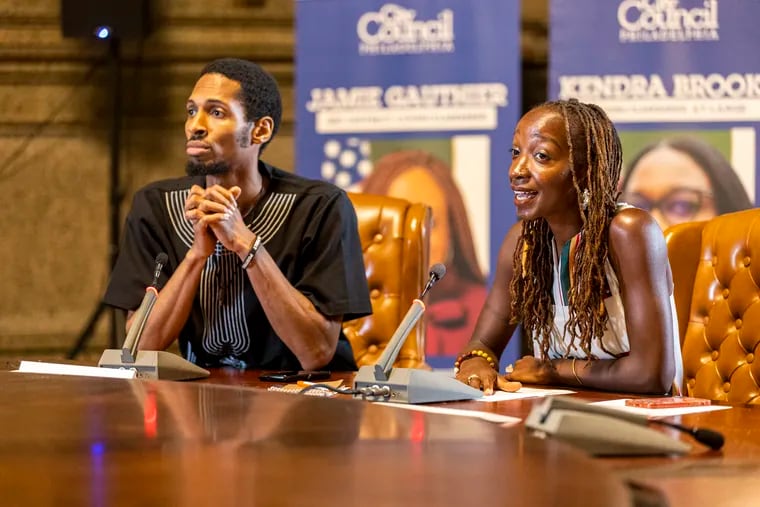
The Philadelphia Reparations Task Force has officially launched.
The 10-member committee, which is tasked with developing a report on how reparations can atone for the impact that slavery, Jim Crow, and institutional racism have had on Black Philadelphians, met for the first time on Tuesday.
Members of the committee sat around a table in City Hall listening to Philadelphians share their thoughts on the effort. Among those who expressed support for reparations were high school students from the Workshop School, Japanese Americans, activists, and Black elders.
“People been talking about reparations for African Americans forever,” said Cecilia Thompson, 60. “Let’s stop talking about it and go to the implementation stage, like how is this hopefully going to happen?”
Thompson called the effort a “Herculean task” and said everyone has an opinion about how reparations should be distributed.
What is the reparations task force?
The purpose of the task force is to provide a report to the city with recommendations on how reparations could look in Philadelphia, from the city, state, and national governments.
The group includes two cochairs and eight members who will each coordinate a volunteer committee in their area of expertise.
City Councilmember Jamie Gauthier, who helped create the task force, said the effort is about repairing generations of harm. The task force consists of various experts because reparations can come in different forms, including through the housing market, criminal justice system, development policies, or addressing the overdose crisis and the impact of the war on drugs, she said.
“We can draw a straight line from the original sin of American slavery, redlining, urban renewal, and all the other racist practices that have happened in that time period to the conditions of our community today,” she said Tuesday. “Whether we’re talking about crumbling schools, whether we’re talking about Black people being robbed of wealth through the housing market, whether we’re talking about gun violence.”
» READ MORE: City Council could explore reparations for Black Philadelphians
How do I get involved in the reparations task force?
Rashaun Williams, one of the cochairs, said that people who are interested in volunteering on the committees should attend an event held by the task force and approach the committee chair.
The task force will hold various public events and initiatives, with its first town hall on June 29.
Those interested in getting involved can also visit the task force’s website, rep215.com, according to Gauthier.
How was the task force created?
The National Coalition of Blacks for Reparations in America (N’COBRA) called on City Council to create the task force before Council’s first session of 2023.
» READ MORE: Reparations for Black people: Group urges City Council to create task force and enforce existing law
Gauthier and Councilmember Kendra Brooks introduced a resolution to create the task force in June 2023. It passed unanimously.
Council sought out volunteer applications for the task force coordinators in November, and the group was slated to launch in February, Black History Month, which Gauthier said was “maybe too ambitious” a goal as the founders wanted to take time to carefully form the team.
Who is on the task force?
Members were required to be “descendants of enslaved Africans in the United States, the descendants of Black, Negro, or Colored Americans since 1865, and/or the descendants of Freedmen emancipated from slavery,” according to Gauthier’s office, and they must have lived in Philadelphia for at least 10 years.
Williams and Breanna Moore, the cochairs of the Philadelphia chapter of N’COBRA, the group that successfully advocated for the city’s task force, are cochairing the panel.
» READ MORE: Philly City Council is looking for volunteers to join its Reparations Task Force
Ayanna Stephens Walker, the principal of the Workshop School, a West Philadelphia high school that relies on project-based learning, is the education coordinator for the task force.
Kevin Mansa, a community advocate and entrepreneur, will coordinate economic justice.
Cara McClellan, an attorney and the founding director at the Advocacy for Racial and Civil Justice Clinic at Penn Carey Law School, is the criminal and legal justice system coordinator.
Jourdyn A. Lawrence, an assistant professor in epidemiology and biostatistics at Drexel’s Dornsife School of Public Health, is the health and wellness coordinator.
Dominique London, an artist and organizer with a master’s degree in city and regional planning, is the urban planning and sustainable development coordinator.
Jackie Newsome, a reverend and attorney, will coordinate law and policy.
Richard White, a historian and founding member of N’COBRA Philadelphia, is the Atlantic world history coordinator.
Have other cities given reparations?
The United States paid reparations to enslavers after slavery was abolished in 1862. Slaveholders were paid for each freed African American they had formerly enslaved. In 1988, the country issued cash reparations to Japanese Americans who were wrongfully imprisoned during World War II. Germany has also paid reparations to Holocaust survivors.
There have been scattered city and state efforts to pursue reparations across the country ahead of Philadelphia’s launch, but few concrete steps have come from them.
Several cities have studied reparations, but Evanston, Ill., stands out for actually executing the idea in 2019 through a fund focused on home ownership. The city committed $10 million to the effort across a decade.
Asheville, N.C., approved dedicating $2.1 million to invest in a reparations effort, and it took almost two years for a commission to recommend its first projects to local leaders.
The city of Palm Springs, Fla., has been in negotiations with a group advocating for reparations for Black and Latino people whose families were forced from their homes on tribal-owned land in the 1950s and 1960s to make way for developers who wanted to build there.
California introduced a package of bills earlier this year after the state’s reparations task force published more than 100 pages of recommendations. The legislative proposals do not include cash payments but would include a way to take back property that was seized via “race-based” eminent domain.
Colorado, New York, and Massachusetts have also authorized reparations studies, but California is the first to make a legislative attempt from the work, according to Politico.
Will Philadelphia pay reparations?
The city has not made a commitment to reparations, and any financial commitment would need to be sorted out by City Council and the mayor during the budget process.
The task force does not yet have a timeline for when it will provide its report, or which budget process it aims to be a part of.
Independent groups in Philadelphia have expressed an interest in contributing reparations, like the Green Street Monthly Meeting of Friends, a Quaker congregation that pursued its own reparations initiative by committing $500,000 over a decade to various issues affecting Black wealth and equity.
» READ MORE: Reparations are a moral calling for these Germantown Quakers. First up: Help for Black homeowners.
What is the 2005 slavery disclosure law?
When N’COBRA advocates urged Council to create a task force, they also called on the city to enforce a 2005 law that requires city-contracted businesses to disclose their historical connections to slavery and submit proposals on financial incentives or programs to benefit Black people.
City spokesperson Sarah Peterson said last year that the law was being enforced by the city Procurement Department and that city-contracted companies are in compliance, but advocates said the law was never enforced.
The 2005 ordinance came after a depository lending study found that banks gave fewer home loans to Black Philadelphians, and fewer business loans to people of color in general, despite Black people and people of color making up the majority of the city’s population.
Moore, the task force cochair and N’COBRA advocate, said last year that she expected the task force to look into the disclosure law.


